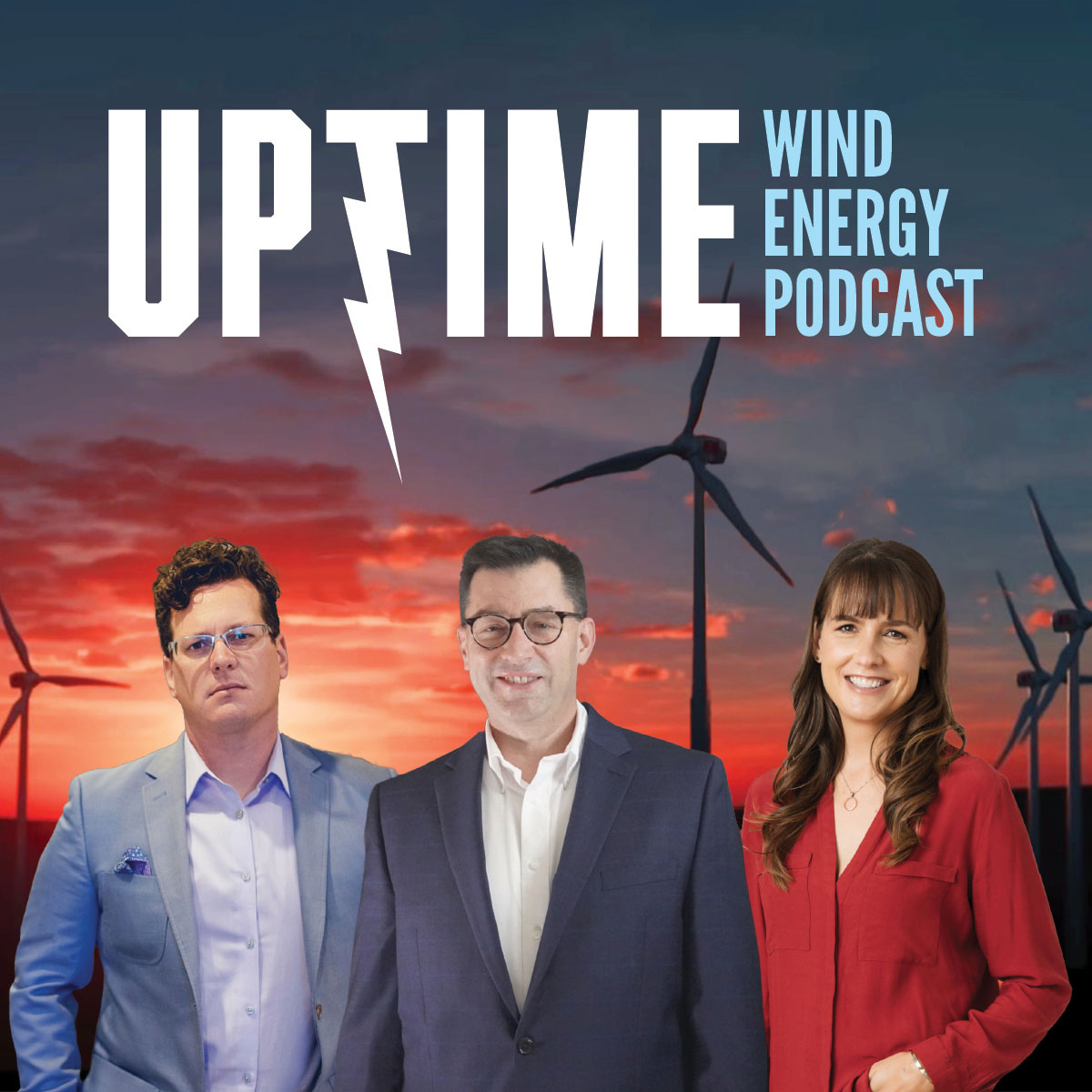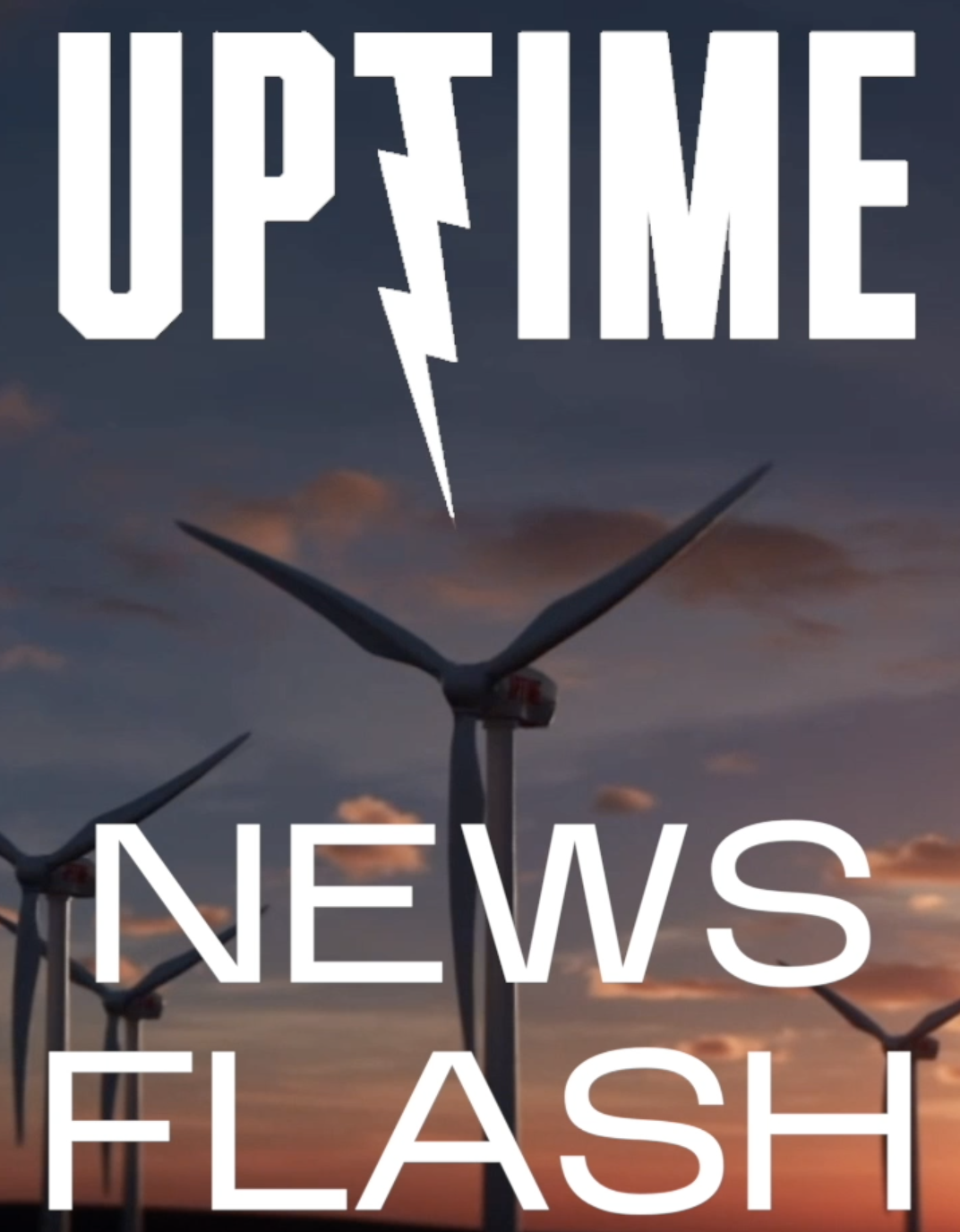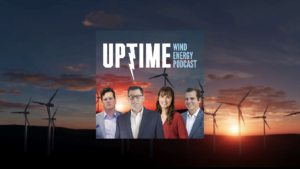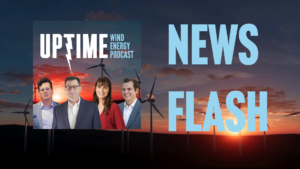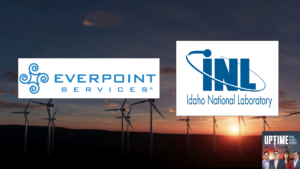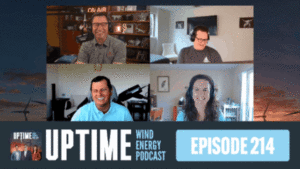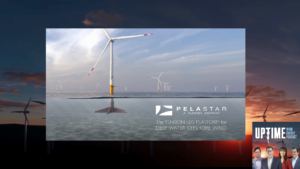The Uptime News Flash is a short form podcast to discuss wind energy mergers, acquisitions, and partnerships. This week in the news Joel Saxum and Allen Hall discuss Germany’s dynamic bidding process for offshore wind, CS Wind acquiring Bladt Industries, and Vestas moving their Asia Pacific headquarters to South Korea.
Pardalote Consulting – https://www.pardaloteconsulting.com
Wind Power LAB – https://windpowerlab.com
Weather Guard Lightning Tech – www.weatherguardwind.com
Intelstor – https://www.intelstor.com
Podcast: Play in new window | Download
Sign up now for Uptime Tech News, our weekly email update on all things wind technology. This episode is sponsored by Weather Guard Lightning Tech. Learn more about Weather Guard’s StrikeTape Wind Turbine LPS retrofit. Follow the show on Facebook, YouTube, Twitter, Linkedin and visit Weather Guard on the web. And subscribe to Rosemary Barnes’ YouTube channel here. Have a question we can answer on the show? Email us!
News Flash 17 July 2023
Allen Hall: I’m Allen Hall, president of Weather Guard Lightning Tech, and I’m here with the Vice President of North American Sales for Wind Power LAB. Joel Saxum, we’re the host of the Uptime podcast, and this is your newsflash. First up, Germany’s first dynamic bidding process for offshore wind zones has generated 12.6 billion euros in proceeds.
The auction received several zero subsidy bids for the three North Sea areas and one Baltic sea area leading to a dynamic bidding stage. Now, this, Joel, this is unusual for Europe. In, in America it’s, it’s as commonplace, but. Zero subsidy bids are a problem for the industry, right?
Joel Saxum: Oh, it says that the costs are either gonna be passed on somehow, right?
They’re gonna be passed on through the supply chain, which is kind of already struggling or to the consumers, right? So at the end of the day, someone has to pay for non subsidy wind. Like if you look at wind in the us, you’re say, if we did away with ptc, well, it makes these projects not that feasible unless PPA prices rise, which eventually.
Passes that cost on the consumer. So the same thing with these bids going here offshore in Germany. They’re not, there’s no subsidies at the round that ended up winning these bids. So all of those costs must be in a tra basically a traditional business model passed on to someone.
Allen Hall: The real trick here is are are they gonna continue on with this process?
Cause I think the industry wants not to do this. I think when Europe put out a statement earlier this week saying they would prefer not to go down this pathway and, and these. Zero subsidy. Bids need to stop. But I think the countries in Germany, one of them I think. Other countries would like to have some cash right now.
And so this is an easy way to get it. It just skews a marketplace.
Joel Saxum: Yeah, I mean if you read any of the press releases, one of the big, not one of the biggest offshore offshore wind player in the world, Ted, they backed outta the auction. Now we don’t know when they backed out of it at what stage, but at some stage they backed out.
And there is a part of a press release from Reuters that says earlier this year, Nipper, who’s Mads Nipper, the CEO of Orsted had warned against. The German pricing model for the auction saying it could ultimately raise cost for consumers. So that’s the, the, you know, Orsted backed out when they saw the prices getting too high.
They don’t want to be, you know, a part of a, something that is an upside down business model before you even start. And, you know, in US dollars, this 14 billion euros for seven gigawatt, or 14 billion US dollars for seven gigawatts of of space in the ocean is a, that’s a lot of money.
Allen Hall: Orted is playing it close to the best.
You see that happening in the United States at the moment on the East Coast, and now you’re seeing it over in Germany, and rightly so, they’re pretty smart at what they do. Danish wind offshore foundation specialist Bladt Industries is set to be acquired by CS Wind. Blatt industry specializes in fabricating foundations and steel structures for the offshore wind industry.
In the acquisition ees to support Blatt industry’s goal of becoming a specialized enabler of global green transition. Bladt Industries, which is under Nordic Capital ownership, shifted its focus solely to the offshore wind industry. So CS Wind, which is based in South Korea has expanded some facilities in the United States and Pueblo, Colorado.
So it looks like CS Wind is making a, a pretty substantial play for the steel involved in wind turbines overall.
Joel Saxum: You know, it’s a great move them partnering with Bladt here because Bladt they have produced more than 25 substations and over 3,100 foundations for the offshore wind. Industry alone.
So now Bladt used to be involved in a lot of North Sea activities, so that’s offshore oil and gas. They make jackets, they make monopiles, they make the transition pieces. So they’re more of like an eng, like an E P I C. We’d call them engineering production. Or engineering procurement, and including construction even.
But they don’t do construction. But however, they do the engineering, they do the building, they do all that. Now they’ve got CS Wind behind them that is a, a massive steel producer, right? So now all of a sudden that they’ve supplied their, their, or they’ve secured their strategic su supply chain, which is something that we, you know, of course is, we know is a painful point in the, the energy transition.
All over the globe. A good partnering. We’ve seen other companies come from the Asia Pacific region and partner up with Danish companies that know a lot about wind. You seebo, Danish Blade Service, Vestas m hhi, Vestas. So that’s a move that we’ve seen before in the past. And I think this one will play out really well.
Allen Hall: Well, it, if there’s gonna be consolidation in heavy industry and particularly steel, you think it’s all going to. Get directed towards South Korea. Right. They’re, they’re building huge ships there at the moment. Yes. Steel production. Yeah. It’s a, it’s just a heavy industry country. It’s all gonna roll that way.
And it, there’s a lot of offshore development in South Korea at the moment, all so it makes sense for CS Wind to, to connect up here for sure.
Joel Saxum: So sticking in South Korea, Allen Vestas is planning to locate their Asia Pacific headquarters to Seoul in September. So they used to be in Singapore. Now they’re planning to open up a core wind turbine equipment plant in 2024.
In South Korea. So I’m thinking that the South Korean government, whether it’s the, the larger government or sole or the, the city of Seoul itself, they must have given them something, right? There’s a, there’s, you know, when, when, usually when big businesses make a move, it’s a tax play or it’s a, there’s some kind of incentive there.
I don’t know exactly what it is, but that’s what it looks like and it makes sense right off air. We were, you and I were talking about the fact that South Korean offshore wind is gonna start to start to make moves there, you know, in that region we know there’s some offshore wind going in. Starting in Japan Taiwan, we have Vietnam around in, in that South Pacific region.
So there is a, there’s definitely a need over there for Vestas to be in the space.
Allen Hall: Yeah. The Vestas has a 300 million investment plan. That means they’re really serious about this transition to South Korea. Vestas has already won contracts for offshore wind turbines off the coast of South Korea so they can see the writing on the wall that South Korea is gonna be a big player in offshore wind and also making products and mean they have all the shipping, right?
So whatever is made in South Korea can get shipped anywhere in the world, and South Korea has all the access to the steel and all the steel making. So for Vestas, I think this is really a safety play, almost It’s security. Being close to really good resources in an engineering community. It’s extremely solid and, and, and heavy industry.
Vestus, this makes complete sense
Joel Saxum: for them. Here. Here. Here’s one for you to think about. Offshore wind, California floaters. Build them in soul.
Allen Hall: Drag ’em right over. Definitely if that’s not in play already, it will be in the next 12 months. That, that makes total sense, if, especially if you can make the journey.
Yeah. Because California’s really not set up to make anything heavy industry like that where South Korea is ready to do it
Joel Saxum: right now. Straight shot across the Pacific.

